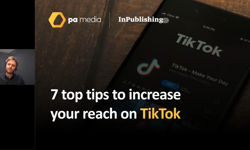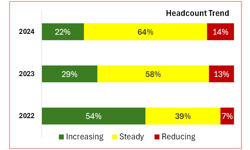
At first glance, 2022 has given us little to be cheerful about.
The year started with Russia invading Ukraine, inflicting terrible suffering on that country and triggering a global energy crisis, and ended with the UK tipping into recession with the lowest growth prospects of any country in the G7.
In the meantime, we’ve had three prime ministers and four chancellors of the exchequer and lost our longest serving monarch. To top things off, just when we didn’t think things could get any worse, Donald Trump has announced that he’s running again for the White House and Twitter has allowed him back on their platform. At time of writing, he’s yet to tweet but I can’t imagine that will last, unless of course Twitter goes out of business first.
So, what is there to feel positive about as we approach 2023?
Well, two things.
Firstly, I detect a spring in publishers’ steps. There’s some excellent stuff happening. Take a recent flurry of bold acquisitions such as Immediate Media’s of Nutracheck, a subscription-based weight management and dietary improvement platform, a move which appears to be highly synergistic; they’re both subs-focused and specialise in food. Meanwhile, in the B2B world, William Reed Business Media acquired a majority shareholding in Rethink Events, a leading events organiser in the agri-tech and food-tech sectors, thereby strengthening WRBM’s position in the food and drink supply chain.
Publishers are creating incredibly immersive content. Just look at the exciting programmes being put together by newsbrands like the Telegraph and Guardian for the World Cup. A vibrant mix of in-depth coverage and analysis, traditional reports alongside the adrenalin rush of live match blogs, print supplements, podcasts and newsletters galore. An expertly curated experience which will be hard to beat elsewhere, online or off.
Further evidence of publishers freeing themselves of the shackles of legacy thinking and confidently striding into the future came in DC Thomson’s October announcement that paid digital subscriptions for their daily news brands had passed 25,000, eighteen months into the company’s drive to build a new, sustainable model for local journalism.
Publishing is looking like a future facing, confident sector again.
Secondly, the tectonic plates of the media world seem at last to be shifting in our favour. Jeremy Hunt’s announcement that he will “legislate to give the Digital Markets Unit new powers to challenge monopolies and increase the competitive pressure to innovate,” is potentially hugely significant and is one of a number of measures being put forward by governments around the world, to start to rein in the digital behemoths.
Combine that with the reverberations of the damning Molly Russell inquest verdict, Meta’s tumbling share price and Twitter’s imminent implosion under its bull in a china shop new owner, Elon Musk, and a levelling of the playing field looks more likely now than it has for some time. 2023 might just be the year.
One final thing. In the September / October issue of InPublishing magazine, Neil Benson offered to give a signed copy of his book, ‘You Can’t Libel the Dead: A Life in Journalism’, to the first reader who translated his snippet of Pitman shorthand. Well, hats off to National World’s Paul Richardson, who correctly deciphered it: “If you are trying to read my extremely rusty shorthand, then you have far too much time on your hands!”
This article was first published in InPublishing magazine. If you would like to be added to the free mailing list to receive the magazine, please register here.










